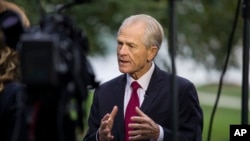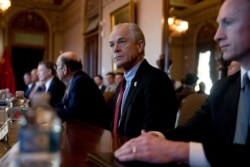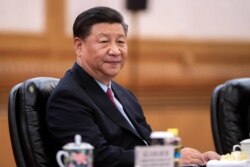China has seized on an embarrassing revelation about U.S. President Donald Trump's top trade adviser to score points and toughen its rhetoric in its long-running trade dispute with the United States.
At a briefing Tuesday in Beijing, Foreign Ministry spokesperson Hua Chunying said the international community had been "in uproar and shocked" by revelations that U.S. trade adviser Peter Navarro used a fictitious analyst as a source of quotes in several books.
"Making up and peddling lies, even making policy based on lies, is not only ridiculous, but also extremely dangerous," Hua was quoted as saying by Reuters news agency.
A day earlier, the state-run television network CCTV said in an editorial that Navarro "has put much of his fantasy into practice as one of the most important pushing hands behind the U.S.'s decisions to stage a trade war against China. He is also the most radical White House adviser to voice the China threat narratives."
Navarro, an academic seen as one of the administration's strongest advocates for a hard line on China trade, has been forced to admit that Ron Vara, a hawkish analyst quoted in several of his books, is in fact a made-up person whose name is an anagram of Navarro's own.
The fiction was first revealed last week by Tessa Morris-Suzuki at the Australian National University, who wrote in the Chronicle of Higher Education that Ron Vara's name turned up a dozen times in at least six of Navarro's books, but that no such person could be found.
Navarro subsequently admitted to having invented the character but defended his action in a press statement, saying the fictional analyst was a "whimsical device and pen name" devised purely for "entertainment value," not as a source of fact.
Credibility
Nevertheless, analysts say the revelation has weakened Navarro's credibility as a key player in efforts to resolve the trade dispute, and handed Beijing a cudgel with which to hammer the American negotiators. Navarro is considered among the architects of the U.S. trade policy and has been a regular participant in those talks.
Gao Mobo, a professor of Chinese studies at the University of Adelaide, said academics need to be impartial and objective, supporting their assertions with empirical evidence or by citing credible sources. "You cannot just write up a statement or make an assertion without substantiation," he said in an email to VOA.
Frank Xie, an associate professor of marketing at the University of South Carolina Aiken, suggested the Navarro episode had given Beijing an opportunity to do something it needed to do anyway — step up its rhetoric in the trade dispute.
China has to appear tough because its leaders realize their country is stuck in a trade war they cannot win, Xie said.
"If it caves in and accepts Trump's deal, all the benefits for the privileged groups with vested interests and state-run enterprises will be gone. That will collapse the party," Xie said. "But if it fights [the U.S.] by decoupling the Chinese economy from the U.S. economy, the party will also fall from power."
Stall tactics
Stuck between two unpalatable alternatives, Xie said, China appears to be trying to stall the trade negotiations in the hope that Trump will be defeated in the 2020 election and they will be able to deal with a new American president.
China is also expected soon to convene a fourth plenary session of the Chinese Communist Party, an event that is long overdue, fueling suspicions of political undercurrents unfavorable to President Xi Jinping. That, Xie said, gives the Chinese leadership another reason to toughen its rhetoric and present a public image of strength.
Despite the commotion over the exposure of Navarro's alter ego, some analysts doubt the revelation will have much impact on the U.S.-China trade talks.
"The Trump administration's credibility cannot be hurt any further anyway," argued Gao, the University of Adelaide professor. Neither will it harm future Sino-U.S. relations, which he said "aren't based on this kind of credibility."
Yen Chen-shen, an international relations professor at Taipei's National Chengchi University, suggested that Navarro's role in the talks is not that important because the U.S. president has his own agenda toward China and largely makes his own decisions.
The professor advised both the U.S. and Chinese governments to downplay Navarro's role if they truly want to strike a trade deal.






